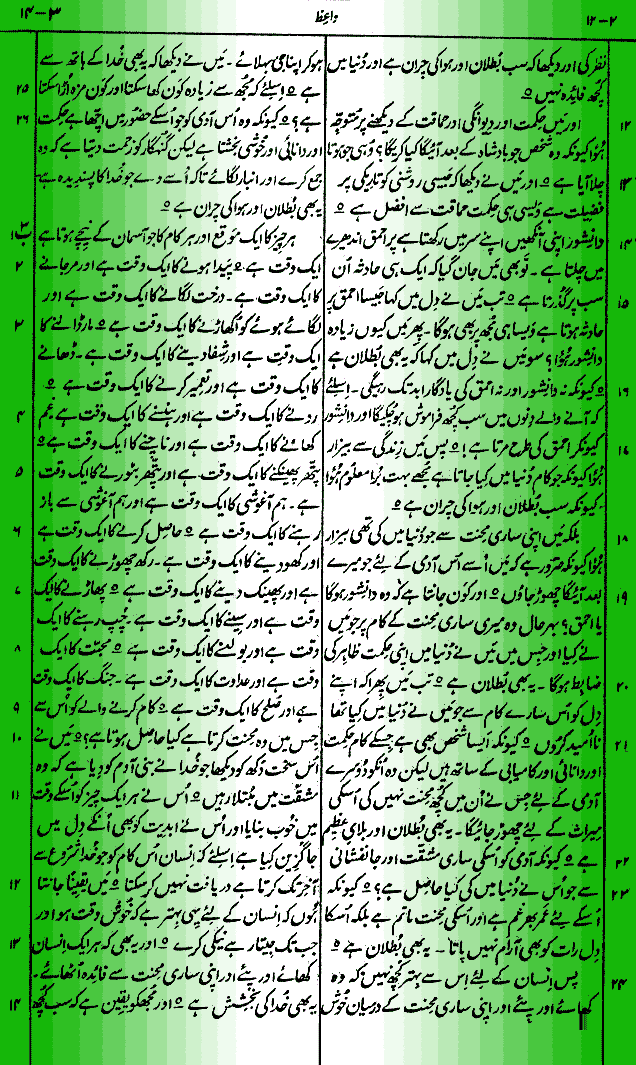
Ec:2:12: And I turned myself to behold wisdom, and madness, and folly: for what can the man do that cometh after the king? even that which hath been already done.
Ec:2:13: Then I saw that wisdom excelleth folly, as far as light excelleth darkness.
Ec:2:14: The wise manís eyes are in his head; but the fool walketh in darkness: and I myself perceived also that one event happeneth to them all.
Ec:2:15: Then said I in my heart, As it happeneth to the fool, so it happeneth even to me; and why was I then more wise? Then I said in my heart, that this also is vanity.
Ec:2:16: For there is no remembrance of the wise more than of the fool for ever; seeing that which now is in the days to come shall all be forgotten. And how dieth the wise man? as the fool.
Ec:2:17: Therefore I hated life; because the work that is wrought under the sun is grievous unto me: for all is vanity and vexation of spirit.
Ec:2:18: Yea, I hated all my labour which I had taken under the sun: because I should leave it unto the man that shall be after me.
Ec:2:19: And who knoweth whether he shall be a wise man or a fool? yet shall he have rule over all my labour wherein I have laboured, and wherein I have shewed myself wise under the sun. This is also vanity.
Ec:2:20: Therefore I went about to cause my heart to despair of all the labour which I took under the sun.
Ec:2:21: For there is a man whose labour is in wisdom, and in knowledge, and in equity; yet to a man that hath not laboured therein shall he leave it for his portion. This also is vanity and a great evil.
Ec:2:22: For what hath man of all his labour, and of the vexation of his heart, wherein he hath laboured under the sun?
Ec:2:23: For all his days are sorrows, and his travail grief; yea, his heart taketh not rest in the night. This is also vanity.
Ec:2:24: There is nothing better for a man, than that he should eat and drink, and that he should make his soul enjoy good in his labour. This also I saw, that it was from the hand of God.
Ec:2:25: For who can eat, or who else can hasten hereunto, more than I?
Ec:2:26: For God giveth to a man that is good in his sight wisdom, and knowledge, and joy: but to the sinner he giveth travail, to gather and to heap up, that he may give to him that is good before God. This also is vanity and vexation of spirit.
Chapter 3
Ec:3:1: To every thing there is a season, and a time to every purpose under the heaven:
Ec:3:2: A time to be born, and a time to die; a time to plant, and a time to pluck up that which is planted;
Ec:3:3: A time to kill, and a time to heal; a time to break down, and a time to build up;
Ec:3:4: A time to weep, and a time to laugh; a time to mourn, and a time to dance;
Ec:3:5: A time to cast away stones, and a time to gather stones together; a time to embrace, and a time to refrain from embracing;
Ec:3:6: A time to get, and a time to lose; a time to keep, and a time to cast away;
Ec:3:7: A time to rend, and a time to sew; a time to keep silence, and a time to speak;
Ec:3:8: A time to love, and a time to hate; a time of war, and a time of peace.
Ec:3:9: What profit hath he that worketh in that wherein he laboureth?
Ec:3:10: I have seen the travail, which God hath given to the sons of men to be exercised in it.
Ec:3:11: He hath made every thing beautiful in his time: also he hath set the world in their heart, so that no man can find out the work that God maketh from the beginning to the end.
Ec:3:12: I know that there is no good in them, but for a man to rejoice, and to do good in his life.
Ec:3:13: And also that every man should eat and drink, and enjoy the good of all his labour, it is the gift of God.
Ec:3:14: I know that, whatsoever God doeth, it shall be for ever: nothing can be put to it, nor any thing taken from it: and God doeth it, that men should fear before him.